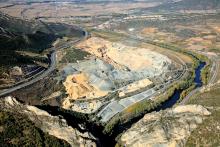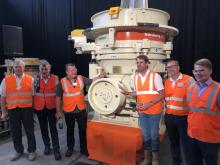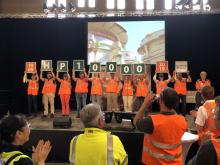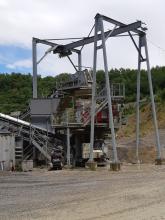Situated near Haro, a town in northern Spain’s stunning La Rioja province, Ofitas de Santutis (Santutis) quarry has been owned by Iñigo Ajuria’s family business, Ofitas de San Felices Group (OSF Group), since the 1960s. After a long period of closure due to reduced market demand, OSF reopened the ophite rock-rich site in 2016 as the company looked for extra mineral resources to produce ballast for the ambitious Basque Y high-speed rail project linking three major Basque Country cities – Vitoria-Gasteiz, Bilbao and Donostia-San Sebastiάn.
Originally due to be completed by 2023 but now behind schedule, the 194km- (157km double track and 37km single track) route will transport passengers and cargo, the latter between the ports of Bilbao and Pasaia. Basque Y is set to reduce journey times between Vitoria-Gasteiz, Bilbao and Donostia-San Sebastiάn to less than one hour, compared to anything between one hour 40 minutes and two-and-a-half hours currently. The new line will also connect the Basque Country with the rest of Spain.
The impressive all-Metso plant set-up at Santutis quarry includes an LT125 Lokotrack jaw crusher, two HP4 cone crushers, two CVB 2060 screens, conveyors, feeders and a cutting-edge plant control system.
“At Santutis we are producing around 800,000 tonnes of material a year – 30% of which is ballast,” says Ajuria, during a September 2019 visit from Aggregates Business. “The Metso plant was very simple to install and is simple to run. The long experience we have of working with Metso and the trust and personal relationships we have built up made the commissioning of the plant easy. For this site, we were extremely clear on what we needed.”
Ajuria says his HP4 cone crushers have proved ideal for ballast production. “They have proven over time to be the best kind of cone crusher for this kind of product. This is based on their capacity, the quality of the final product and the longevity of wear parts. HP cone crushers are also highly reliable machines. Given the hardstone in our quarry, which has a Los Angeles abrasion value of 10, reliability is not always evident with every cone crusher. We also find that the Metso CVB screens are highly reliable and efficient. We’ve had our CVB 2060s for some time.”
Santutis’s Metso plant control system includes cameras on the jaw and cone crusher feed openings, for early detection of any oversized material blockages or other production issues. The quarry’s conveyors are not fixed to ground foundations to allow for production flexibility, easier engineering maintenance and cleaning. This is said to be a first conveyors set-up of its kind for Metso. Santutis operates 8am-5pm Monday to Friday for 10 months each year, closing in January and February due to the Basque Country’s severely cold winter weather.
As well as being renowned for its high-quality ballast, Santutis also offers customers high-quality 4-12mm, 12-20mm and 20-25mm aggregates products, plus a 0-4mm sand product for concrete production.
Santutis’s aggregates product customers, including general construction and highway contractors, are situated anywhere in a 150km-radius of the quarry. They either collect their purchased products from the quarry, or OSF delivers them by either one of the company’s own or a hired-in truck.
Santutis has 15 million tonnes of mineral reserves, allowing Ajuria and his OSF leadership team to plan for many more years of fruitful aggregates and ballast production at the site.
“In the future, we are looking at bringing in another Lokotrack jaw crusher to meet demand on the Basque Y high-speed rail project. This will allow us to double our ballast output,” explains Ajuria, whose OSF business also operates the spectacular Ofitas de San Felices quarry, next to his own vineyard, near Haro, and a third quarry in Granada, southern Spain.
Swedish quarrying equipment giant Sandvik is expanding its 800i series of connected cone crushers to include three new crushers for aggregates and mining applications.
The three new models are the CH830i, CH840i and CS840i, and the manufacturer says that each crusher comes with its new Automation and Connectivity System (ACS) as standard.
Sandvik adds that the new 800i series of premium cone crushers features mechanical upgrades, connectivity, advanced automation and rebuild possibilities to predict performance, maximise uptime and offer sustainability at the lowest possible cost.
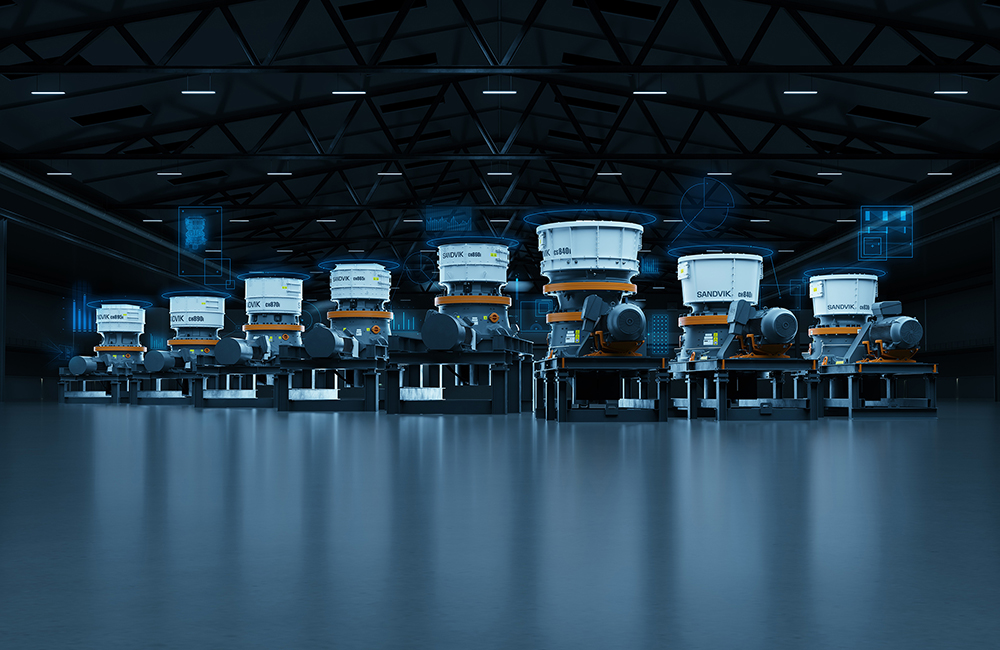
Connected to the My Sandvik customer portal, the 800i crushers are designed to enable managers and operators to make decisions based on facts and see areas for improvement directly, increasing uptime and availability. My Sandvik can be accessed using a smartphone, tablet or computer.
The 800i connected crusher series features the new generation ACS as standard. The system continuously monitors and optimises crusher performance and controls the complete lubrication system, increasing uptime and reliability.
The 800i series has been toughened and improved to offer greater reliability, higher availability and a low risk of critical failure.
Bolted rather than welded top and bottom shell liners are designed to make changing 90% faster.
“New, digital technologies will transform the way mines and quarries work," said Mats Dahlberg, VP Lifecycle Service, Stationary Crushing and Screening, Sandvik. "My Sandvik is the first major step in gaining insights into productivity and predictive maintenance that will drive our industry forward. It’s great to offer our customers a service that will truly make a difference to their profitability."
Keestrack’s dealer for Norway and Sweden, Fredheim Maskin, staged its 10th demo days event at its Spydeberg, near Oslo, HQ on 17-19 October 2019.
A shuttle service to a nearby granite quarry was organised to showcase Keestrack’s solutions for modern aggregates production. Event attendees saw a fully-electric powered 200tonnes per hour production plant line producing six end products. Machines on show comprised an electric feeding hopper on skids and a heavy range Keestrack H6e cone crusher with infeed belt, single deck pre-screen and three-deck after screen with recirculation belt, which was supplying material to a K3e screen. To facilitate stockpiling, there were two S1e stackers with automatic swivelling function and one S5e track mobile stacker.
All plant line units, which also included a B7e primary jaw crusher and K7e scalper, were electrically powered by the H6e’s drop-off engine/generator unit. Keestrack says the key advantage of such a drop-off engine unit is it lowers the service costs due to less dust emissions in the filters, less vibrations, easier and safer maintenance due to working on ground level and lower noise machine noise levels.
The 700kVA gen set supplying plug-in power to all the quarry showcased machines meant the plant production line had a combined fuel consumption of less than 90 litres per hour (l/h). The power needed by each plant is calculated at the following ratio: B7e 25 litres/hour (l/h), K7e 8 l/h, H6e 45 l/h, S1e both 1l/h, K3e 5l/h, S5e 5 l/h.
The granite processing production line showed the huge saving potentials of the Keestrack ‘e’-version hybrid electric plug-in concept. Keestrack says gains would have been even higher if the complete production line was connected to the mains by plug-in. Compared to conventional diesel-hydraulic systems, Keestrack says plant production energy costs can be reduced up to 80%, with plant noise levels during emission-free plug-in operation down by around 30%.
Keestrack says its modern ‘e’-version plants remain as flexible and highly mobile as conventional technology without having to add a lot of additional transport weight, compared to diesel-hydraulic plants.
Even the larger hybrid plants can be transported in one piece, without dismantling. This, says Keestrack, also contributes to short set-up times. The full integration of all electrical system functions is controlled by intelligent Keestrack plant control. This includes numerous automated routines (sequential start/stop) and the comprehensive monitoring, with bi-directional transmission of machine and production data, via the satellite-based Keestrack-er system.

